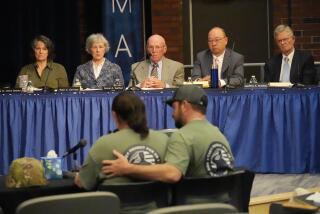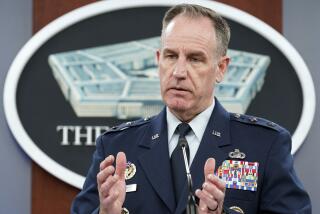Panel finds Guard is down
WASHINGTON — National Guard and reserve forces remain inadequately equipped and unprepared to deal with a wide range of domestic disasters, particularly an attack with unconventional weapons, a congressional commission has concluded.
In its final report, the panel said Thursday that congressional and Pentagon policymakers had been reluctant to acknowledge that the military remains the only institution that can respond quickly to natural and man-made disasters. That reluctance “places the nation at risk,” because it has led to shortfalls in planning and readiness, the report said.
Reserve units have been taxed by repeated deployments to Iraq and Afghanistan, but the commission said the inadequacies were not solely the result of the wars. Overall, it said, the Pentagon has failed to provide adequate funding, on the “flawed assumption” that current training for military operations overseas would suffice for domestic duties as well.
The commission was set up by Congress in 2005 to examine the needs of the Guard and reserves amid their heavy deployment to war zones. The panel sounded a special alarm over what it said was the Guard’s insufficient training -- due to inadequate funding -- for a chemical, biological or nuclear strike.
“This is an appalling gap that places the nation and its citizens at greater risk,” the commission found.
The issue of National Guard readiness has been politically tense since the Bush administration came under fire for its handling of Hurricane Katrina’s aftermath in 2005.
Several governors -- including California’s Arnold Schwarzenegger -- have said that because of heavy use overseas, National Guard units have been unable to deal with natural disasters, such as last year’s tornadoes in the Midwest.
The Bush administration has said that arrangements between states to share forces are adequate to meet any shortfalls.
But the commission report was highly critical of the Pentagon’s spending plans for the Guard and reserves.
The Pentagon has more than doubled its spending in the last two years on equipment for the Guard and reserves, spending nearly $7 billion in 2006 out of an overall budget of about $32 billion.
However, the commission said equipment necessities alone require an additional $48 billion.
“The high operational use of Reserve equipment in the current conflicts has degraded their readiness for both combat operations and domestic emergency response,” the report found.
The commission, headed by retired Marine Maj. Gen. Arnold L. Punaro, recommended changes in laws to ensure disaster response is a “core competency” of the military, equal in importance to fighting wars.
Defense Secretary Robert M. Gates has been receptive to the commission’s recommendations in the past, implementing most suggestions made in an interim report last March.
But Air Force Gen. Gene Renuart, head of the military command chiefly responsible for the defense of North America, insisted Thursday that the Pentagon has the capability to deal with attacks involving weapons of mass destruction.
“The capacity of the Defense Department to respond to a chemical, biological event exists now,” Renuart told the Associated Press. “It, today, is not as robust as we would like because of the demand on forces that we’ve placed across the country. . . . I can do it today. It would be harder on the [military] services, but I could respond.”
More to Read
Sign up for Essential California
The most important California stories and recommendations in your inbox every morning.
You may occasionally receive promotional content from the Los Angeles Times.










